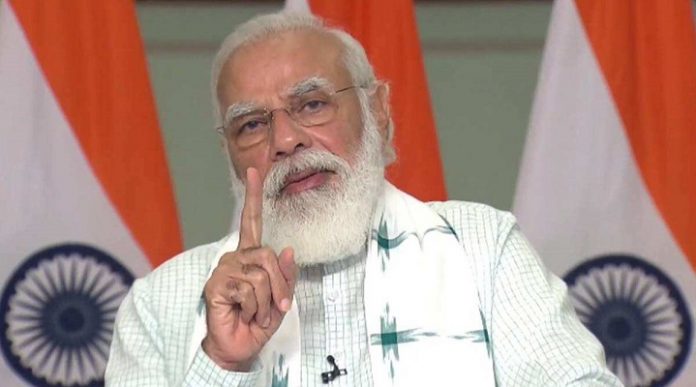Prime Minister Narendra Modi said India has the potential to become a reliable weapons supplier to friendly foreign countries, strengthen its strategic partnerships and consolidate its role as a net security provider in the Indian Ocean as it takes strides towards self-reliance in the defence sector.
Speaking at a seminar on self-reliance in defence, the PM said the government’s resolve for ‘Atmanirbhar Bharat’ was not “inward-looking” but aimed at making the global economy “resilient and strong” as well as promoting world peace.
The Society of Indian Defence Manufacturers (SIDM), Federation of Indian Chambers of Commerce and Industry (FICCI) and the defence ministry’s defence production department jointly organised the online seminar.
There was no mention of the PM’s address in the line-up of events circulated before the seminar. In the surprise appearance, he spoke for 18 minutes, touching upon different aspects of self-reliance in the defence sector, the role of the domestic industry, steps taken by the government to transform India into a global hub for defence manufacturing and reforms towards ease of doing business.
Enumerating the measures taken by the government for self-reliance in the defence sector — from creating a separate budget for the purchase of locally produced military hardware to notifying a negative import list and raising the foreign direct investment (FDI) limit — the PM said the domestic industry could look forward to more orders in the coming times as a result of initiatives taken to boost self-reliance.
Earlier this month, the government announced a separate budgetary outlay of Rs 52,000 crores for domestic capital procurement and came out with a negative import list.
In a significant step on the long road towards self-reliance in defence, India on August 9 announced it will ban the import of 101 different types of weapons, systems and ammunition over the next five years — from artillery guns to light military transport aircraft and conventional submarines to long-range land-attack cruise missiles.
Modi said more defence items would be progressively added to the negative import list to encourage the domestic industry. The government is likely to notify a second negative import list early next year. “We have to collectively achieve the target of Atmanirbhar Bharat. It is a win-win situation for everyone including the public sector, private sector and foreign companies. The government is committed to providing a better eco-system for this,” he said.
The PM said it was the best option for India’s foreign partners to start production in the country looking at its market size. He said the country’s focus was on a co-production model involving joint ventures with foreign partners.
“We are witnessing a new mindset in the defence sector. For a modern and Atmanirbhar Bharat, self-confidence in the defence sector is very important,” he said, adding that the government’s focus was on cutting red tape and rolling out the red carpet for the industry.
The PM said that it was no secret that India was one of the biggest arms importers in the world but things were changing and the government had taken several steps to unshackle the defence sector during the last few years.
India was the third-biggest military spender in the world last year after the United States and China, the Stockholm International Peace Research Institute (Sipri) said in a report released in April.
Imports account for 60-65% of the country’s military requirements and it has signed contracts worth billions of dollars during the last decade for weapons and systems including fighter jets, air defence missile systems, submarine hunter planes, attack helicopters, heavy-lift choppers and lightweight howitzers.

